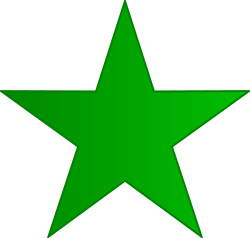Esperanto
English

Etymology
Esperanto Esperanto. Originally, this was the pseudonym assumed by the language's creator, L. L. Zamenhof, and the language was called Lingvo Internacia (“international language”).
Pronunciation
- Lua error in Module:parameters at line 360: Parameter 1 should be a valid language or etymology language code; the value "RP" is not valid. See WT:LOL and WT:LOL/E.
- Lua error in Module:parameters at line 360: Parameter 1 should be a valid language or etymology language code; the value "GenAm" is not valid. See WT:LOL and WT:LOL/E.
- Rhymes: -æntəʊ, -ɑːntəʊ
Proper noun
Esperanto
- An international auxiliary language designed by L. L. Zamenhof with a base vocabulary inspired by Indo-European languages such as English, French, German, Italian, Spanish, and Russian, and having a streamlined grammar with completely regular conjugations, declensions, and inflections.
- (figuratively) Anything that is used as a single international medium in place of plural distinct national media.
- The U.S. dollar is the Esperanto of currency.
- 1994, Terry Pratchet, Interesting Times:
- …making its usual explicit request in the Esperanto of brutality.
Quotations
- For quotations using this term, see Citations:Esperanto.
Derived terms
Translations
|
See also
- Category:Esperanto language
- Appendix:Esperanto Swadesh list for a Swadesh list of basic vocabulary words in Esperanto
Further reading
- Reta Vortaro (short : ReVo) a multingual dictionary with esperanto definitions and translations in many languages. See also ReVo
- ISO 639-1 code eo, ISO 639-3 code epo (SIL)
- Ethnologue entry for Esperanto, epo

- Akademio de Esperanto
Anagrams
Dutch
Etymology
Borrowed from Esperanto Esperanto.
Pronunciation
Proper noun
Esperanto n
Derived terms
Esperanto
Etymology
From Doktoro Esperanto ("Doctor Hopeful"), the pen-name of Esperanto's author, Dr. Ludwik Łazarz Zamenhof, when he published the language in 1887; from esperanto (“one who hopes”), from the verb esperi (“to hope”), from French espérer, Spanish esperar, ultimately from Latin spērō (“to hope”).
Pronunciation
Proper noun
Esperanto (accusative Esperanton)
Derived terms
- esperanta (“of or relating to Esperanto”)
- esperantano (“proponent of Esperanto”)
- Esperantido
- esperantigi (“to translate or transliterate to Esperanto”)
- Esperantio, Esperantujo (“notional land of Esperantists”)
- esperantismo (“the ideal of a neutral, universal auxiliary language”)
- esperantistiĝi (“to become an Esperantist”)
- esperantisto (“active user of Esperanto, Esperantist”)
- esperantologio (“linguistic study of Esperanto, Esperantology”)
- esperantologo (“specialist in Esperantology, an Esperantologist”)
- esperantumado (“use of Esperanto, Esperanto-related activities”)
German
Pronunciation
Proper noun
Esperanto n (proper noun, strong, genitive Esperantos or Esperanto)
Usage notes
- The word can be used with or without a definite article: (Das) Esperanto ist eine Kunstsprache. (“Esperanto is a constructed language.”) The form with no article is generally more common, but the article is necessary in the genitive case (e.g. die Grammatik des Esperanto) and with the preposition in (e.g. die Pluralbildung im Esperanto).
Further reading
- “Esperanto” in Duden online
Ido
Etymology
Borrowed from Esperanto Esperanto.
Pronunciation
Proper noun
Esperanto
Synonyms
Derived terms
See also
Interlingua
Noun
Esperanto
Italian
Noun
Esperanto m (uncountable)
See also
Anagrams
Portuguese
Noun
Esperanto m (uncountable)
- Misspelling of esperanto.
Romanian
Noun
Esperanto n (uncountable)
- Alternative letter-case form of esperanto
Tagalog
Etymology
Borrowed from Spanish esperanto or English Esperanto.
Pronunciation
Noun
Esperanto
- Esperanto (language)
Derived terms
Turkish
Etymology
Proper noun
Esperanto
- English terms derived from Proto-Indo-European
- English terms derived from the Proto-Indo-European root *speh₁-
- English terms borrowed from Esperanto
- English terms derived from Esperanto
- English 4-syllable words
- English terms with IPA pronunciation
- English terms with audio links
- Rhymes:English/æntəʊ
- Rhymes:English/æntəʊ/4 syllables
- Rhymes:English/ɑːntəʊ
- Rhymes:English/ɑːntəʊ/4 syllables
- English lemmas
- English proper nouns
- English uncountable nouns
- English terms with usage examples
- English terms with quotations
- en:Artificial languages
- Dutch terms borrowed from Esperanto
- Dutch terms derived from Esperanto
- Dutch terms with IPA pronunciation
- Dutch terms with audio links
- Dutch lemmas
- Dutch proper nouns
- Dutch entries with language name categories using raw markup
- Dutch neuter nouns
- Dutch eponyms
- nl:Artificial languages
- Esperanto terms derived from French
- Esperanto terms derived from Spanish
- Esperanto terms derived from Latin
- Esperanto terms with IPA pronunciation
- Esperanto terms with audio links
- Rhymes:Esperanto/anto
- Esperanto lemmas
- Esperanto proper nouns
- eo:Artificial languages
- German 4-syllable words
- German terms with IPA pronunciation
- German terms with audio links
- German lemmas
- German proper nouns
- German neuter nouns
- de:Artificial languages
- Ido terms borrowed from Esperanto
- Ido terms derived from Esperanto
- Ido terms with IPA pronunciation
- Ido lemmas
- Ido proper nouns
- Interlingua lemmas
- Interlingua nouns
- ia:Artificial languages
- Italian lemmas
- Italian nouns
- Italian uncountable nouns
- Italian masculine nouns
- it:Artificial languages
- Portuguese lemmas
- Portuguese nouns
- Portuguese uncountable nouns
- Portuguese masculine nouns
- Portuguese misspellings
- Romanian lemmas
- Romanian nouns
- Romanian uncountable nouns
- Romanian neuter nouns
- Tagalog terms borrowed from Spanish
- Tagalog terms derived from Spanish
- Tagalog terms borrowed from English
- Tagalog terms derived from English
- Tagalog 4-syllable words
- Tagalog terms with IPA pronunciation
- Tagalog lemmas
- Tagalog nouns
- Turkish terms borrowed from Esperanto
- Turkish terms derived from Esperanto
- Turkish lemmas
- Turkish proper nouns
- tr:Artificial languages


